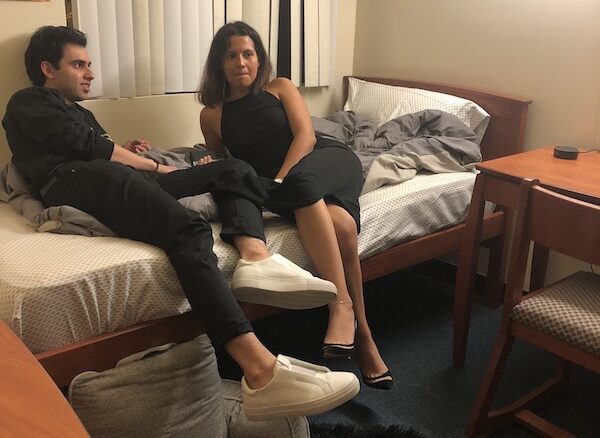
Rules, rules and only rules.
Pepperdine students love to complain about dorm rules that set curfews on how late members of the opposite sex can visit.
A Pepp Post survey of 52 students found that 75 percent did not like the visitation rules. Moreover, nearly half of students surveyed said they had opposite gender guests after hours and one-third had had opposite gender guests spend the night.
“In theory most students don’t want to have a policy, they think they can self-govern,” said Maura Page, director of Residence Life at Pepperdine. “But in practice it’s a really helpful tool in order to navigate roommate conflict.”
Pepperdine, which is affiliated with the Churches of Christ, is less strict than other religious schools in the country. Pepperdine administrators have loosened their regulations over the years.
Opinions on the policies
Pepperdine’s visitation restrictions come in part out of the school’s Christian heritage in the Churches of Christ, a Protestant tradition that takes a very high view of scripture.
“Our understanding of Scripture is that sexual activity is to be expressed only in a marriage between husband and wife, and therefore we are called to a life of chastity when unmarried and a life of fidelity within marriage,” according to the Seaver Code of Conduct.
Page also said the limitations are meant to decrease roommate conflicts and uncomfortable experiences for roommates.
However, though campus housing emphasizes the restrictions, some students said they’ve seen the rules broken.
“Some of my suitemates would often bring boys over in their rooms, even in freshman housing, and they never really got caught,” Marie Marmolejo, senior integrated marketing communication major, said.
Another student, junior psychology major Isabella Porchia, witnessed first hand her suitemates violating the regulations.
“I know one of my suitemates got written up for having a guy over past visitation hours once but most of them had guys come over and nobody really got caught other than that one time,” Porchia said.
Three quarters of those polled think students break the rules and roughly half said they aren’t enforced.
Residential Advisor Daniel Zarasua agreed that the policy isn’t always respected, especially when students move out of freshman housing.
“I do think it’s easier when you move out of freshman dorms because in other dorms it’s harder for an RA to control the situation, unless someone is being obvious and obnoxious the RAs won’t know,” said Zarasua, a junior mathematics major.
The poll found that roughly 30 percent said they did not know the visitation rules for freshman dorms, and confusion grew in the apartments. Nearly 54 percent didn’t know that everyone present could get in trouble, not just the person hosting the opposite gender guest.
“Once I heard a girl that was laughing as I was walking in the corridors and it was passed 1 a.m. so I walked in and they were in the suite,” Zarasua said. “I was about to write them up but then they told me they thought that girls were allowed in the suite up to 2 a.m. and in the rooms by 1 a.m. So I decided to give them the benefit of the doubt.”
Students believe that the visitation hour restrictions should be changed because students will break these rules anyways and that they shouldn’t have restrictions based on gender.
“It’s Pepperdine’s duties to impose these regulations, but its pretentious to believe that students, especially because of the age they are, will obey,” Marmolejo said. “Not just because they want to be rebellious but also because it’s just natural.”
Some students appreciated the policies.
“I am OK with these policies, because it gives us students the right amount of space,” Filippo Margheritini, junior international relations major, said. “I never had issues regarding the visitation policy, I personally wouldn’t be comfortable if my roommate had his girlfriend over, almost like an invasion of privacy.”
More students were glad Pepperdine doesn’t have opposite genders share bathrooms.
“My sister attended a public university where the dorms were separated by gender but the bathrooms were co-ed, and I wouldn’t want that, it’s just strange to share a bathroom with the opposite gender,” Jaibir Nihal Singh, junior media production major, said.
The poll found that 71 percent agreed that the opposite sex shouldn’t be allowed to use bathroom facilities.
“I do agree with the fact that girls and boys should have different bathrooms,” Marmolejo said. “I would personally feel very uncomfortable if the bathrooms were shared and coed, also because of hygienic purposes.”
Pepperdine vs other Church of Christ universities in the country
Church of Christ Universities ranked by how restrictive the visitation hours are for students of opposite genders.
| 1. | Harding University, Arkansas |
| 2. | Abilene Christian University, Texas |
| 3. | Lipscomb University, Tennessee |
| 4. | Rochester College, Michigan |
| 5. | Pepperdine University, Malibu |
While Pepperdine seems very strict in comparison to most universities in the country, its policies are much more lenient than those of other Church of Christ schools.
Harding University is a Church of Christ university in Arkansas. Students of opposite genders get to visit each other’s room on special days only.
“If they want to meet they can do so in the lobby but we have an open-half once a month, when students of the opposite gender can visit each other’s accommodations but we don’t have daily visitation allowed,” said Kathy Allen, director of Housing at Harding.
Abilene Christian University in Texas, which is one of the largest Church of Christ universities, has open houses where depending on the residence hall and the year, they have different nights of the week for visitation.
“Freshman can stay up to 11 p.m. because they have a midnight curfew but second-year students can visit until midnight cause they don’t have a curfew — they have to sign in and out at the front desk, it’s policy,” said Abbey Green, housing manager for Abilene.
Lipscomb University, a Church of Christ college in Tennessee, only allows opposite genders to visit in open areas in dormitory halls — and only every other night.
“They can’t be in each others rooms,” said Rachel Smiley, director of Student Services at Lipscomb University.
Page said Pepperdine’s visitation policies are right in the middle compared to other universities.
“I think we are less conservative than other religious schools but more conservative than state schools,” Page said.
Page said Pepperdine’s regulations aren’t as confining as many other universities.
“I remembered when I attended college, I used to play tennis against this one school called Grove City College in Pennsylvania and I remembered seeing signs saying that the opposite sex cannot be in the room unless the door was to be kept opened,” Page said.
Students usually compare Pepperdine to the policies of University of California Los Angeles or University of Southern California, which are not church affiliated.
“When I first came to Pepperdine I was quite shocked by the regulations that the student housing imposed on the students,” junior pre-dental major Liana Sheilly said. “My sister attended both UCLA and USC, and everything was completely different from her experience.”
Evolvement of regulations
Pepperdine’s policies have evolved over the years, as the school used to be much stricter when it came to regulations regarding opposite gender interactions in the dorms. Pepperdine now has some suites of all-females and all-males right next to each other.
“The regulations have evolved since years back because society is now more comfortable with coed by suite, Eden House and Seaside are two examples,” Page said.
The side-by-side male and female suites also mimic the situation abroad, Breanna Grigsby wrote in an August 2012 Pepperdine Graphic article.
Pepperdine rules have also changed for the RAs in the last few years, as they now don’t control their residents as much as they used to.
“Pepperdine has become more lenient from when I was a first-year student, as they don’t make us RAs take rounds in the morning or at night to make sure that everything is OK and that rules are being followed,” Zarasua said.
Audrey Miotto completed the reporting for this story under the supervision of Dr. Christina Littlefield and Dr. Theresa de los Santos in Jour 241 in fall 2018. Dr. Littlefield supervised the web story.




